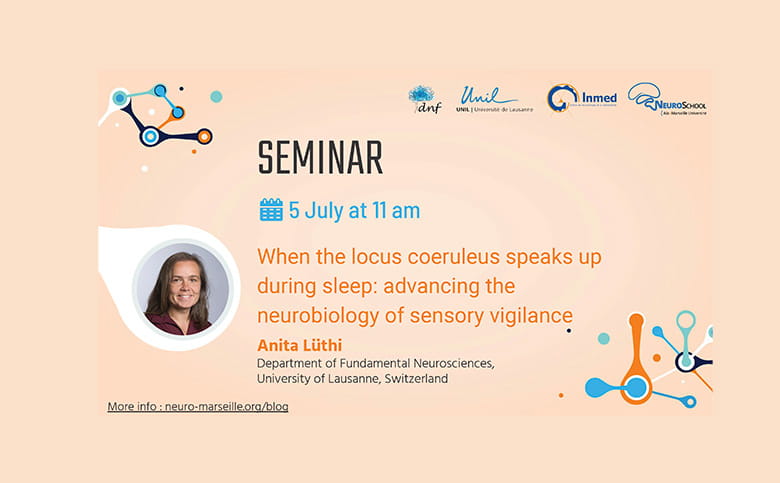Description de la soumission d'un avis

When the locus coeruleus speaks up during sleep: advancing the neurobiology of sensory vigilance
Seminar by Anita Lüthi (University of Lausanne, Switzerland)
When the locus coeruleus speaks up during sleep: advancing the neurobiology of sensory vigilance by Anita Lüthi
For the next NeuroSchool seminar, we are pleased to welcome Prof. Anita Lüthi, who leads a research group at the Department of Fundamental Neurosciences at the University of Lausanne, Switzerland. She will present her research on a recently identified novel principle in the organization of mammalian sleep that contributes to a long debate about a fundamental conflict of sleep: the need to be both continuous and fragile. The seminar will take place on July, 5th 2021, at 11 am (UTC+2), via Zoom.
📌 Attention, PhD Program students, please register via this form on Ametice.
Registration to receive the connection link is at the end of this page.
Anita Lüthi leads a research group at the Department of Fundamental Neurosciences at the University of Lausanne, Switzerland. Recently, she identified a novel principle in the organization of mammalian sleep that contributes to a long debate about a fundamental conflict of sleep: the need to be both continuous and fragile. The continuity of sleep is required to promote beneficial effects for the brain and body, whereas the fragility of sleep is essential to respond to important sensory stimuli and threats. This work has stimulated transdisciplinary research with human sleep researchers, including Prof. Jan Born, University of Tübingen, Germany, to address disorders of arousability from sleep, such as in human insomnia or chronic pain. She has published in major neuroscience journals.
She has received several awards. She is the President of the Swiss Neuroscience Society and Scientific Committee member of the European Sleep Research Societies. She also serves on the Editorial Boards of the European and the American Journal of Neuroscience and is a member of the Advisory Board of Current Biology. She has given Keynote Lectures and Symposium talks at major international conferences, such as the American Society for Neuroscience, the Federation of the European Neuroscience Societies, the European Sleep Research Society, and the Russian Sleep Society International Forum.
Abstract
There is no doubt that sleep is quite the opposite of wakefulness. Behaviorally, meaningful interactions with the environment are suppressed; neurobiologically, wake-promoting brain areas are silent. However, for decades we’ve known that at least some wake-promoting areas continue to discharge action potentials during sleep – sparsely, but consistently. My talk will show that sleep-related activity in the locus coeruleus (LC), the major noradrenergic area of the brain known for its powerful wake-promoting actions, has so far been underestimated for sleep’s behavioural, architectural, and neurobiological assets. Using closed-loop optogenetic interrogation of LC activity during sleep, imaging of free noradrenaline levels in the forebrain, and heart rate monitoring in combination with global and local sleep recordings, we find that LC activity leads to pulsatile increases in the levels of noradrenaline on the infra low (~50-sec) time scale during non-REM sleep, while its levels decline during REM sleep. On this same time scale, LC activity variations play a role in sleep architecture and regulation, spectral dynamics in the forebrain, and the coordination of autonomic output. Together, my talk will make the case for a renewal of the dichotomous view on sleep and wakefulness, emphasizing that wake-related activity intruding into sleep is inextricably linked to the physiology of mammalian sleep and will, most likely, turn out to be a culprit in its manifold disruptions in pathophysiological conditions.


